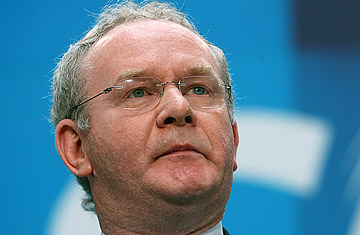
Sinn Fein's chief negotiator, Martin McGuinness, proposing the Motion on Policing at Sinn Fein's Extraordinary Ard Fheis on Policing at the Royal Dublin Society in Dublin, Ireland.
But now, the IRA's onetime reputed chief of staff won't have the police to bad-mouth any more. Long suspected of directing bombings across Ireland and Britain while also operating as one of the main spokesmen for Sinn Fein, the group's political wing, McGuinness, 56, used his veteran's status over the weekend to propose that a special Sinn Fein convention support Northern Ireland's police force for the first time in the party's — or Ireland's — history.
With the support of Sinn Fein president Gerry Adams, the proposal was backed overwhelmingly, and it could cement more than a decade of gradual efforts to reconcile Northern Ireland's Catholics, and their aspirations for a united Ireland, with the Protestants who wish to remain part of the United Kingdom. Should the remaining differences be closed in the coming weeks, McGuinness will share power with Rev. Ian Paisley, the 81-year-old hardline unionist leader, as Northern Ireland's First Ministers on March 25.
McGuinness' transformation from armed radical to potential statesman mirrors the journey his fellow Irish republicans have been on since the IRA declared a cease-fire in 1994. Under the strategic direction of Adams, republicans have turned the IRA, one of the world's toughest terrorist organizations, into a viable political force.
They say their objective is still a united Ireland, but instead of storming British bastions, they're being voted into them. On the way Sinn Fein, once the junior partner to the IRA, became the dominant arm. They've overtaken rivals to become the major Catholic party in Northern Ireland, and they may soon be influential enough in the Irish Republic to earn a minority position in government there.
Just as remarkable has been the way Sinn Fein has moved away from its hard-core principles without causing a major internal rift. Twenty years ago they started taking up most of the posts they were elected to, reversing a refusal to recognize elected bodies on either side of the Irish border. In September 2005 the IRA got rid of its weapons, implicitly acknowledging that politics was the only way forward. And now, after a substantial program of police reform that dropped a lot of the force's British associations, brought in tougher human rights standards and encouraged more Catholics to join up, they are prepared to become involved — and perhaps even join — the Police Service of Northern Ireland. A few holdouts predictably accused Adams of being a traitor before the policing vote, but they don't carry much in the way of political influence or serious armed threat.
A few wrinkles remain, as they always do when it comes to Northern Ireland reconciliation. The more hardline Protestants in Paisley's Democratic Unionist Party feel a bit like the prodigal son's brother in the Bible — they think Sinn Fein is being praised for something it should have done all along. They're also wary because an apparent promise to get rid of the IRA's guns ended up taking years to fulfill.
For its part, Sinn Fein's support for policing is conditional: it thinks Paisley should agree to form a power-sharing government in Belfast first, while Paisley wants to see his opponent's newfound support for policing in action before the new government is formed.
But in one sense, that's minor horsetrading. Even if they are going only so far forward at the minute, Adams and McGuinness can't now step back from the party's decision. Opposition to law enforcement is no longer a strategic principle. Martin McGuinness's future is in talking to the police instead of hiding from them — or worse. At this point, anything else would be a cop-out.
